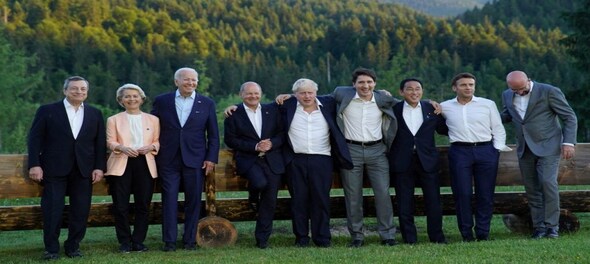
Leaders of the Group of Seven (G7) countries met in the Schloss Elmau national monument, nestled in Germany’s Bavarian Alps for a three-day summit starting from June 26. Leaders from Canada, France, Germany, Italy, Japan, the United Kingdom and the United States, as well as the European Union, were present. Germany also invited Indian Prime Minister Narendra Modi as well as leaders from Indonesia, South Africa, Senegal and Argentina.
These countries would be having discussions on climate change, energy and other issues for the developing democratic nations like food security, health, counter-terrorism, gender equality and democracy.
However, the shadow of the Russian invasion of Ukraine, which has now stretched into its fourth month, hung over the meeting. Within hours of the event starting, Russian missiles hit the Ukrainian capital of Kyiv for the first time in weeks.
Here are key takeaways from the first two days of the meet:
G7 members stand with Ukraine
The Group of Seven highlighted their dedication to support Ukraine even as rising energy prices have threatened the stability of ruling governments across Europe. France, in particular, may be losing appetite for a prolonged conflict, especially as President Emmanuel Macron lost his parliamentary majority, reported the BBC. The leaders announced that they will be banning all imports of gold from Russia, which is one of the top five exporters of gold in the world.
Additional discussions revolved around capping the price of Russian crude and oil in order to cut Moscos’ oil revenue. Russia’s treasury has been kept afloat as soaring energy prices have made Russian exports that much more valuable.
With Ukrainian President Volodymyr Zelensky expected to join the meeting via video link, the beleaguered leader is expected to press the group for more aid against the Russian invasion. The requests are likely expected to be in the form of heavy weapons and further sanctions on Russia.
But continuing to defend Ukraine may have dire costs for the rest of the world. Ukraine is a major exporter of food grains and food supply to the world, especially to African and Middle Eastern nations. But the conflict has ensured that most shipments of grain and other food items are either stuck in the Black Sea or within the borders of Ukraine itself. Short supply is causing food prices to rise rapidly at a time when energy prices are already contributing to inflation around the world.
The G7 leaders are expected to have discussions with the invited countries about what can be done to tackle inflation. Though, President Zelenksy also asked for efforts to help Ukraine export stuck grain shipments, reported Al Jazeera.
An eye on China
While Russia has become the pariah of the western world, China’s soaring economic might combined with its increasingly hawkish diplomacy has made it no friends. US President Joe Biden announced that the “Partnership for Global Infrastructure”, where the EU and the US would invest $634 billion to improve the infrastructure in countries. While not explicitly stated, the initiative is evidently one way that the west is looking to combat China’s Belt and Road Initiative.
While some of the countries hope that the investments will allow countries to wean off their dependence on fossil fuels, German Chancellor Olaf Scholz and Italian Prime Minister Mario Draghi have instead called for more investments in natural gas to navigate the current energy crisis.
It is not yet known whether China, or Russia, are going to attend the upcoming G20 meeting in Indonesia as relations with China being one of the lowest in recent memories. European Commission President Ursula von der Leyen has stated that it would be important for Western leaders to attend the summit and “tell him to his (Russian President Vladimir Putin) face what we think” and to not “paralyze the entire G-20.”
Climate change
Climate change is now an ever-present feature of discussions at the summit. With protesters in Bavaria clamouring against global inaction in the face of the imminent climate crisis, the leaders are expected to discuss with the guest countries the matter of climate change and energy.
Apart from the global infrastructure initiative, the group is also in discussions to lend aid towards energy transition to India, Indonesia, Vietnam and Senegal in the form of Just Energy Transition Partnerships, which is already in the process of being implemented in South Africa.
But at a time when energy prices are skyrocketing, it will be a hard sell for the leaders to convince other nations to abandon their coal furnaces and gas pipelines.
Check out our in-depth Market Coverage, Business News & get real-time Stock Market Updates on CNBC-TV18. Also, Watch our channels CNBC-TV18, CNBC Awaaz and CNBC Bajar Live on-the-go!


Feroze Gandhi to Rahul Gandhi: Rae Bareli's tryst with Congress
May 3, 2024 11:36 AM
Rahul Gandhi to contest from Raebareli, close aide KL Sharma from Amethi
May 3, 2024 8:39 AM
BJP's Hindi heartland dominance faces test in phase 3 polls
May 2, 2024 9:14 PM

